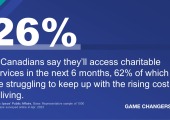The GTA: Agenda, Jobs, Economy & Tax Cuts
Issues Watch and the Economy
Agenda
There is solid consensus among residents in the Greater Toronto Area (GTA) regarding the most important issues facing the area today. Residents were asked, "I'd like you to tell me what you consider to be the most important issue or concerns facing the Greater Toronto Area today -- and the second most important issue?". The survey results show that three-quarters (73%) of residents are most concerned about, in ranked order, jobs -- an issue on the rise, crime and education according to a recent CFRB-Angus Reid Poll conducted among 400 randomly-selected adult residents of the Greater Toronto Area. The survey was conducted between September 11th and 14th, 1996. The main findings of the poll are:
GTA residents feel that the top three issues facing Toronto today are:
- Jobs/unemployment -- (35%, compared to 22% in October 1995 and 14% in April 1995), particularly among those aged 35 to 54 and middle-income earners;
- Crime/violence gangs -- (25%, compared to 26% in October 1995 which held the #1 issue overall), especially among those aged 55 and over; and,
- Education/schools -- (13%), moreso among females than males and among the university educated.
In addition, Torontonians surveyed place identical levels of agenda placement -- each one given 11 percent agenda priority -- for taxes (slightly decreased from 15% in October 1995), poverty/homelessness and healthcare/hospitals (12% in October 1995) as important concerns facing the city today.
Issues Watch
Residents of the Greater Toronto Area were asked whether they agreed or disagreed with several statements concerning various economic issues.
Jobs and the Economy:
Over four-in-ten (42%) GTA residents agree with the statement, "I am, or someone in my household is worried about losing their job or being laid off over the next year".
56 percent of those surveyed disagree with this statement and a total of two percent of GTA residents were undecided.
Females (51%) are more likely to express job anxiety than males (33%), as well as lower-income earners and those who are not university educated. High income earners and the university educated are least likely to agree with this statement.
Casinos: Should There Be a Casino in Toronto?
When GTA residents were asked whether they agree or disagree with the statement, "If they held a referendum to approve building a casino in Toronto, I would vote in favour of it", public support was split.
One-half (51%) of GTA residents agree with this statement, compared to 46 percent who disagree. A total of three percent were undecided.
Support for a casino in Toronto has increased from 36% in October 1995 to 51% in September 1996.
Younger residents and higher-income earners are more likely to support building a casino in Toronto, whereas older and less affluent residents are more likely to disagree with this development.
Gambling & Video Lotteries: Evil Influence or Not?
A majority of GTA residents disagree with the statement, "Gambling and video lottery terminals are an evil influence on society".
Just under six-in-ten (58%) GTA residents disagree with this statement, compared to just under four-in-ten (38%) who agree. A total of four percent of GTA residents were undecided.
Older GTA residents (aged 55 and older) and the least affluent (earning $30K or less per year) are most likely to agree that gambling and lottery terminals are "an evil influence on society". Federal Tax Cuts and Deficit Trade-Offs
When faced with a trade-off scenario between three potential choices regarding the current federal deficit and a potential tax cut, Torontorians are most likely to accept no tax cuts in order to use the money to pay down the deficit instead. Respondents were asked, "Thinking of the current federal deficit and a potential tax cut, what would you rather have: (Read in randomized order) A tax cut even if this might slow down deficit reduction; No tax cuts, but use the money to pay down the deficit instead; OR No tax cuts, but use the money to maintain current social programs.". The findings are:
One-half (49%) of GTA residents would accept no tax cuts to assist paying down the deficit instead, particularly among males, older residents and the most affluent.
One-third (34%) would choose no tax cuts to use the money to maintain current social programs, especially among females, those aged 18 to 34 and middle-income earners.
The least favourable choice among GTA residents would be to accept tax cuts even if this might slow down deficit reduction (14%), specifically among those who are least educated.
The CFRB/Angus Reid Group Toronto Poll
This poll was conducted by telephone between September 11th and 14th 1996, among a representative cross-section of 400 randomly selected adults residing in the Greater Toronto Area (GTA). The data were statistically weighted to ensure the sample's age/sex composition reflects that of the actual GTA population according to the 1991 Census data. With the GTA-wide sample of 400, one can say with 95 percent certainty that the results are within +5.0 percentage points of what they would have been had the entire GTA adult population been polled. The margin of error will be larger within the various sub-groupings of the survey population.
For further information, contact:
John Wright
Senior Vice-President
Angus Reid Group
(416) 324-2900
More insights about Consumer Goods


![[WEBINAR] KEYS: Global Trends - The Uneasy Decade](/sites/default/files/styles/related_more_insights/public/ct/event/2025-09/thumbnail-templates_0.png?itok=Qh37M2xL)
![[WEBINAR] Canadian EV Adoption Trends in 2025](/sites/default/files/styles/related_more_insights/public/ct/event/2025-01/thumb.png?itok=RSGzZvMm)
![[WEBINAR] Sustainable Packaging: A Potential Avenue of Distinction](/sites/default/files/styles/related_more_insights/public/ct/event/2023-09/SustainablePackaging_WebR_feature%20copy.jpg?itok=X0DpNf_C)